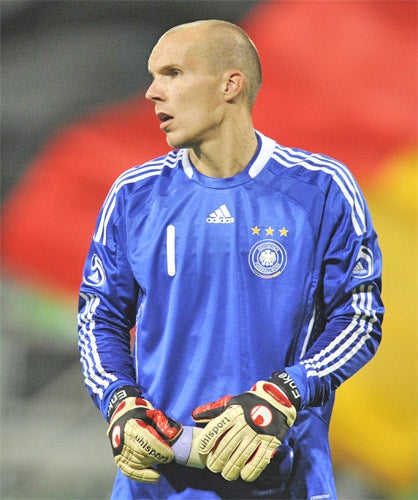Hannover fans come out in force to honour Enke

Football fans in Germany yesterday marked the one-year anniversary of the death of Robert Enke with thousands arriving at Hannover's Niedersachsen Stadium to pay their respects and sign a book of condolence.
Enke took his own life following a battle against depression. The 32-year-old committed suicide on a railway line close to his home, prompting an outpouring of grief among football fans and the general public.
One year on, Germany coach Joachim Löw and soccer federation chief Dr Theo Zwanziger laid a wreath at his grave, accompanied by Enke's widow Teresa and Hannover president Martin Kind in a private ceremony.
On a cold and rainy day, fans entered a small tent erected near the stadium to write in a book of remembrance. Supporters are still struggling to come to terms with the loss of a man who was primed to be Germany's first-choice goalkeeper at the World Cup last summer.
However, Enke was suffering from an illness he had kept secret from all but his closest family and friends, one which continues to elicit little understanding from some. That, according to Zwanziger, must now change. "Our national team goalkeeper Robert Enke voluntarily took his life a year ago to this day," he said.
"The mourning, the pain and above all the question, 'why?', continue to accompany us to this day. We have got to remember that that question still must be answered. Robert Enke was a strong national team goalkeeper, but he had a weakness. We have got to be prepared not to make such a weakness into a taboo and allow it to be kept secret, but to try and bring it out of its silence."
In a video message on the German Football Association's website, Zwanziger called on the whole nation to fight against discrimination, the fear of which prevented Enke from going public with his illness, and help prevent a similar tragedy in future.
And not only must the issue of depression be combated, according to Zwanziger. "We should consider the way we deal with weaknesses and all play our part in dealing with it openly," he appealed.
"The events of 9 November, 1938, when Jews were forced out of Germany and which culminated in the shock of a world war, should remind us how to call on all of our strength to fight discrimination. Also for us as footballers, who live in a society and play this wonderful sport, we must remember our responsibility not to exclude others – not to exclude others because of their religion, because of their skin colour or because of their sexual orientation.
"These all belong together. Discrimination and the stigmatisation of weaknesses are the enemies of a civilised society. Therefore, let football bring people together and not leave anybody out."
Enke was capped only eight times by Germany, but he was the No 1 choice of coach Joachim Löw at the time of his death, although an injury meant he was not part of the squad which was preparing for friendly matches with Chile and the Ivory Coast a year ago to the day.
His club Hannover failed to win a game for 13 matches following his death and only just avoided relegation with victory over Bochum on the final day of last season.
A message on the club's website read: "We are sad that he has left us, but we are also thankful and proud that he was with us. His time with our team has attached his name to that of Hannover 96 for eternity."
Join our commenting forum
Join thought-provoking conversations, follow other Independent readers and see their replies
Comments
Bookmark popover
Removed from bookmarks